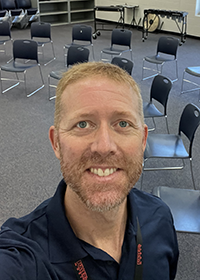Name 
Mike Blakeslee
School & School System Where You Work
Hope Middle School, Pitt County Schools
Number of Years Teaching
21
Teaching Area(s)
Band
Grade Level
Middle School
What do you love most about teaching music?
Music gives all students an equal chance of being successful, artistic, creative, and expressive. Music doesn’t judge – music moves us to work together in ways that no other subject can. It is truly a universal language, accessible by all!
Who inspired you to be a music educator and how did they inspire you?
I had a number of amazing teachers growing up, who all taught and inspired me in different ways. My most significant inspiration came from my High School band director, Tony Pappalardo. He set an example for students that showed how hard work leads to rewards. He was committed to student success, and built strong relationships with every one of his students, no matter their ability. He made the band room feel important yet welcoming, and he held us to high standards. I can’t imagine that I’d be doing anything else as a result of being in his Band.
What did you need the most when you started teaching?
The biggest thing I needed was time to adjust to the other side of the podium. The requirements of the job that aren’t taught in college courses became suddenly apparent, from scheduling issues, to best practice grading, to building level concerns that I hadn’t even thought about before. I was ready for the musical experience, but not the “teacher” responsibility. It took some time to adjust to the breadth of what this job truly entails.
Describe the biggest challenge to teaching music education and how you have worked to overcome this challenge?
I think finding a way to get a student to recognize the link between music and the rest of their life is absolutely essential. For some students, the band room is where they go first at school, and is the last place they stop before getting on the bus. They feel comfortable here, and learn a lot of valuable life lessons. Helping them to transfer over those skills and successes to other areas of their day can be the most meaningful accomplishment for me. For them, the realization that success doesn’t depend on their location, but rather on the level of effort they put in to their own learning.
How do you advocate for your program?
Open, frequent communication with students, parents, and administrators is the first part of my advocacy program. People cannot support a program if they are unaware of what’s happening with it. Second, I always try to take advantage of any opportunity that comes up. This could be performing for an event, playing seasonal music in the hallway, or a pep rally or athletic event. Sometimes we have to create chances to perform. Whatever it takes to get students seen as an integral part of the school community.
What is one piece of advice you would give to beginning teachers?
Don’t feel like you have to do everything alone. There is always someone that is looking out for you to be successful, and will help in any way they can. They may not be in your building, or even in your district. But you will always have someone to lean on. Find those people, and cultivate an open conversation with them about your teaching.
How do you build relationships with students and parents?
I put a lot of value in honest, open communication. And I try to model that both with written messages, and my interactions in my classroom. I make a point of reaching out to parents all the time with updates, praise, and invitations to performances and events. My students know that my classroom is a place with high standards, but also where mistakes are seen as an essential part of growth – even from me as a teacher. I always want my students and their parents to have trust that we are all working toward progress, no matter how fast or slow it ends up being. Without that open, honest relationship, we’d be stuck spinning our wheels every day. Growth is growth!
